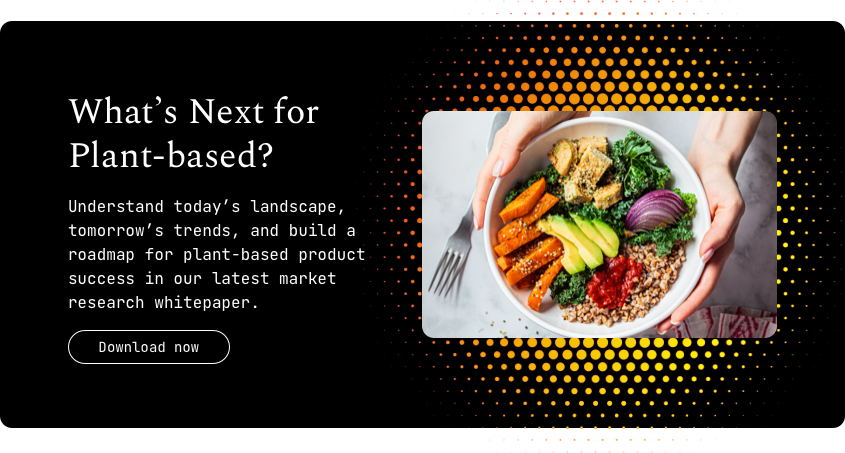Creating a product that delivers the true flavor and texture of cheese, or real "cheesiness", could perhaps be seen as the holy grail of vegan alternatives in the plant-based food industry. Achieving this feat hasn't been easy. However, now innovative brands and manufacturers are taking on the challenge and succeeding. So, let’s take a better look at what lies behind this interesting issue.
Why is Cheesiness So Important in the Plant-based Food Industry?
Cheese is undeniably one of the most popular foods on the planet. In fact, in a recent study, 40% of participants stated that they would be reluctant to become vegan as they couldn’t give up cheese. And demand for convincing, high-quality vegan cheese alternatives has never been higher.
Our research identified that the demand for cheesiness and creaminess is on the rise. Plant-based behaviors are increasingly fuelled by nostalgia for comfort food and the need for indulgence, and the words "cheesy" and "creamy" are widely used among vegans to describe comfort food recipes. So, any producer that can meet this demand with a great vegan cheese is surely set for success.
Historically, however, a common consumer complaint has been that many vegan cheeses just weren’t a patch on conventional cheeses.
What Are the Roadblocks to Replicating Cheese?
There are various roadblocks that have prevented producers in the plant-based food industry from creating the perfect vegan cheese. One of these is finding an effective alternative for animal rennet – the ingredient that sets cheese. The traditional source of animal rennet is the stomach lining of calves, that contains an enzyme called chymosin, which helps digestion and milk absorption.
Obviously, animal rennet is not suitable for use in vegetarian or vegan cheeses, but alternative, animal-free alternatives do exist. These are either vegetable-based (made from plants such as thistles, nettles, or figs), microbial (created from molds or fungi sources), or genetically modified rennet. However, while these provide an alternative to animal rennet, they may not necessarily result in products with exactly the same qualities as conventional cheese.
While vegetarian cheese producers just have this obstacle to overcome, vegan cheese producers have the additional stumbling block of finding a good alternative to cow’s milk to use. This is no small feat, when it needs to match the flavor and texture of traditional cheeses. This can be tricky when constituents of cow's milk, such as casein and lactose, all contribute to the quality of the end product.
A Promising Future
However, innovative producers are now meeting this challenge, and the future of the vegan plant-based cheese market is looking promising. In fact, Tesco reported that it's seen sales of vegan cheeses increase by almost a third over the past year. And, the vegan cheese market is predicted to grow by $1.26 billion from 2021 to 2026, with market growth accelerating at a compound annual growth rate of 8.41%.
At a time when sales in the plant-based food industry have been stagnating, this is testament to the demand for this product. Higher prices for many vegan cheese alternatives than conventional cheeses can present a barrier to an increase in sales, especially in these challenging economic times. However, a rising range of affordable vegan cheeses is now hitting the shelves, with offerings from big brands, such as Philadelphia’s Almond & Oat soft cheese alternative, Boursin’s Plant-based Garlic & Herbs cheese substitute, and Babybel Plant-based Snacks all joining the cheeseboard selection.
A growing throng of artisan cheese producers are also launching products that achieve the holy grail of plant-based cheese perfection, made from a whole range of alternative, vegan-friendly ingredients.
A Wide Range of Ingredients
In fact, the plant-based food industry uses a very wide variety of ingredients indeed to create convincing alternatives to dairy milk cheese. This includes various plant-based milks, such as coconut, soy, rice, and oat are used to make original vegan cheese products. Producers can also use several types of nut, including almonds, cashews, and macadamias, which create a rich and nutty taste similar to that found in conventional cheese.
Perhaps more unusual ingredients include shea, which Honestly Tasty uses to create its innovative camembert-style cheese – Shamembert. Lupin beans are also used and are a primary ingredient in Veggie Karma’s range of vegan cheese alternatives made in Barcelona. Another unusual ingredient is sprouted brown rice. This is also a great source of vitamins, minerals, and dietary fibers, making cheese created from it healthier than many. Cheese is even now being produced using microalgae, to create an authentic-tasting product which has the added advantage of being very high in vitamin B12.
Vegan cheese producer Willicroft, based in Amsterdam, uses an assortment of white beans, such as cannellini and haricot, to create its interesting range of plant-based cheeses. This includes its gouda-style Young Dutch, its parmesan-like Italian Aged, and its Greek White feta alternative.
In addition, Greek-based, vegan cheese brand Violife, whose products are exported to 60 countries, uses coconut starch to create its popular plant-based goods.
Cheeses made from alternative ingredients to cow's milk are also likely to appeal to consumers who specifically choose a plant-based diet to help the environment, as they offer more sustainable alternatives. Traditional cheese has a high carbon footprint, as if you eat it three to five times a week, this is roughly the same as driving a car 514 miles.
A Pizza Cheese
A particular challenge in the plant-based food industry is the quest to create cheesy vegan excellence in the shape of convincing mozzarella cheese – that gooey perfection which tops your pizza. This is especially important considering that plant-based consumers are placing increasing importance on comfort food, of which the pizza figures highly.
Where mozzarella is concerned, vegetarian alternatives have previously struggled to match the stretchy, stringy texture of the original and melt satisfactorily. The casein protein present in cows’ milk is fundamental to achieving the required texture and stretchiness in the cheese, so this has been a major stumbling block to some vegan alternatives. However, producers are starting to overcome this obstacle.
Start-up company New Culture has found a way to create animal-free casein, using a precision fermentation process that gives its "dairy-identical" vegan mozzarella the traditional cheese color, stretchiness, and melting qualities of the conventional variety. This is good news for all those plant-based pizza loving consumers out there, in need of some comfort food.
Another start-up producer, Remilk, is also creating animal-free milk proteins, using microbial fermentation, for a base that’s identical to dairy milk. Its commercial partners then use it to create dairy-identical products such as cheese, yoghurt, and cream.
However, the quest to create the perfect vegan mozzarella doesn’t end there. In the home of pizza, innovative Italian-based producer Mozzarisella also offers plant-based and organic mozzarella alternatives, made using sprouted brown rice.
Get the Expert Assistance You Need
With such fantastic new vegan cheese alternatives now on the market, the plant-based food industry appears to have the holy grail of cheesiness well within reach. If you’re planning to launch your own brand-new plant-based food product, or even introduce a great new vegan cheese, ensure that you get the expert assistance you need to stand out and succeed in this highly competitive field.
.jpg)





